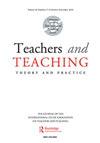Pedagogical listening: understanding how teachers listen to student struggle during mathematical sense-making discussions
IF 1.9
2区 教育学
Q2 EDUCATION & EDUCATIONAL RESEARCH
引用次数: 0
Abstract
Research suggests that students’ verbalisation of how they are struggling to understand something new is important for learning mathematics with conceptual understanding. However, less is known about how teachers listen while students ‘think aloud’ through struggle. In this study, we sought to answer the following research question: What types of listening do teachers enact when students are verbalising struggle during mathematical sense-making discussions? We detail how we created and applied a Framework for Pedagogical Listening, which extends previous theoretical and empirical research on teacher listening to identify and differentiate between five types of teacher listening: empathic, supportive, educative, self-reflective and generative. Our study involved nine teachers and their students in the US and Scotland, contexts which are focused on reform-efforts towards inquiry-oriented mathematics instruction that engages students in sense-making discussions. Our findings suggest that the five types of teacher listening in our framework are present when students verbalise struggle during sense-making discussions, and that our Pedagogical Listening Framework is a useful tool for identifying and documenting the complex ways teachers listen when students verbalise struggle. We present three vignettes of classroom interaction during mathematical discussion that illustrate the five pedagogical listening types.教学听力:理解教师如何倾听学生在数学意义构建讨论中的挣扎
研究表明,学生们用语言表达他们是如何努力理解新事物的,这对于用概念理解来学习数学很重要。然而,对于教师如何在学生通过斗争“大声思考”时倾听,人们知之甚少。在本研究中,我们试图回答以下研究问题:当学生在数学意义构建讨论中语言表达困难时,教师采取何种类型的听力?我们详细介绍了我们如何创建和应用一个教学性倾听框架,该框架扩展了之前关于教师倾听的理论和实证研究,以识别和区分五种类型的教师倾听:移情型、支持型、教育型、自我反思型和生成型。我们的研究涉及美国和苏格兰的九名教师和他们的学生,研究的重点是探究性数学教学的改革努力,让学生参与意义建构的讨论。我们的研究结果表明,在我们的框架中,当学生在构建意义的讨论中出现语言困难时,教师的五种听力类型就会出现。我们的教学听力框架是一种有用的工具,可以识别和记录学生在语言困难时教师的复杂倾听方式。我们呈现了数学讨论期间课堂互动的三个小插曲,说明了五种教学听力类型。
本文章由计算机程序翻译,如有差异,请以英文原文为准。
求助全文
约1分钟内获得全文
求助全文
来源期刊

Teachers and Teaching
EDUCATION & EDUCATIONAL RESEARCH-
CiteScore
4.20
自引率
7.40%
发文量
71
期刊介绍:
Teachers and Teaching: theory and practice provides an international focal point for the publication of research on teachers and teaching, in particular on teacher thinking. It offers a means of communication and dissemination of completed research and research in progress, whilst also providing a forum for debate between researchers. This unique journal draws together qualitative and quantitative research from different countries and cultures which focus on the social, political and historical contexts of teaching as work. It includes theoretical reflections on the connections between theory and practice in teachers" work and other research of professional interest.
 求助内容:
求助内容: 应助结果提醒方式:
应助结果提醒方式:


